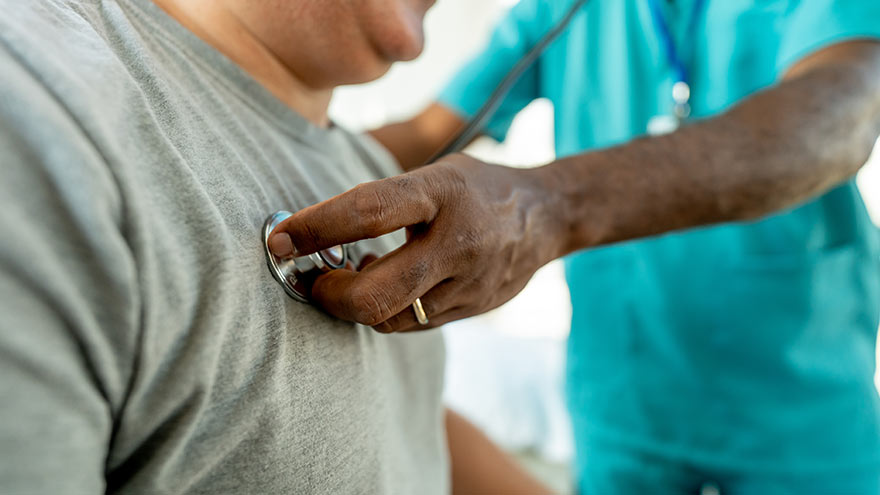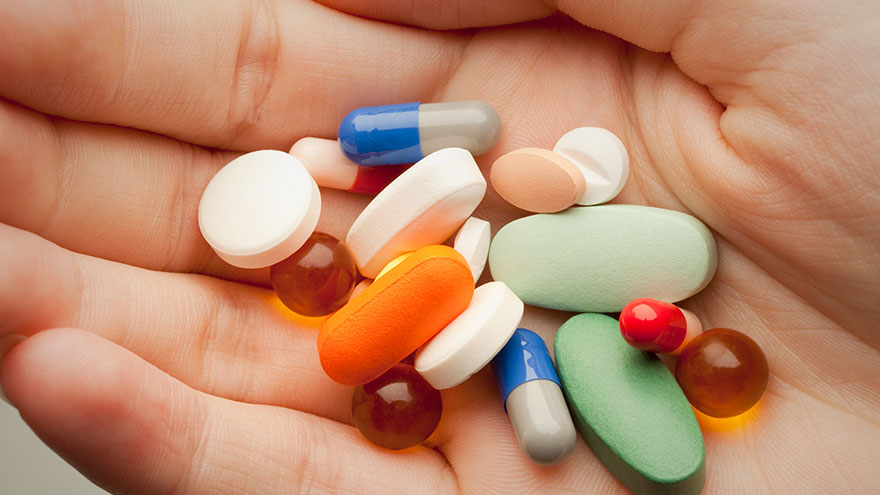Buscar
Results for 'forms'
Clear-
Women's Heart Center
Heart disease is the leading cause of death in women. According to the American Heart Association, heart disease kills more women than all forms of cancer combined and yet only 44% of women recognize that cardiovascular disease is their greatest health threat. Recognizing the urgent need for women's cardiac care, Renown Health established the Helaine Greenberg Women's Heart Center, the first of its kind in Nevada.
-
Electrophysiology
Cardiac Electrophysiology Electrophysiology (EP) is the study of the electrical system of the heart. Renown Health's highly trained cardiac electrophysiology team assesses the heart's electrical system and diagnoses abnormal heartbeats or arrhythmia. As the only IAC Cardiac Electrophysiology accredited facility in Nevada, we proudly demonstrate exemplary care and quality for all of our patients.
-
Programa de insuficiencia cardíaca
At Renown Health, our nationally recognized Heart Failure Program provides best-in-class diagnoses, treatment and management of heart failure. Patients receive specialized care from our dedicated team of experts which includes nurse navigators, clinical coordinators and highly trained cardiologists. We are proud to serve our community and lead the region in heart failure care.
-
Riesgos de insuficiencia cardíaca y esperar lo inesperado
For the average person, detecting the signs of heart failure can be tricky, especially since people can look fairly healthy and have few symptoms. We asked Christopher Rowan, M.D., of the Renown Institute for Heart & Vascular Health, to answer our most pressing questions about heart failure. Even with more technology in medicine and a greater awareness about health today, the Centers for Disease Control and Prevention still reports that one in every four U.S. deaths is caused by heart disease. The real tragedy of heart-related deaths is that they are both common and preventable. “Heart failure can have many forms that are seen in anyone at any age," says Christopher Rowan, MD, with Renown Institute for Heart & Vascular Health. "As many forms as it has, it can also have as many causes. Although the symptoms of heart failure are numerous, people can look mostly healthy and have relatively few symptoms.” We sat down with Dr. Rowan to ask some common questions about heart failure. How can I tell if I have heart failure? What are some sure signs? "The signs and symptoms of heart failure are numerous, but the most common ones are shortness of breath when trying to walk (which differs from somebody’s normal pattern); progressive swelling in the feet, legs and ankles that does not disappear overnight; and waking up at night due to shortness of breath or waking up more than normal to urinate," Dr. Rowan says. Can heart failure be cured? "The treatment of heart failure depends on its primary cause," Dr. Rowan says. "Various forms of heart failure can be cured; however, the person is always at risk for recurrence. Some forms of heart failure have no cure but can be managed and stabilized and people can live a relatively normal life for years." What can I do to prevent heart failure? "To prevent the onset of heart failure, know your risk factors, including high blood pressure, diabetes, smoking and an unhealthy lifestyle," Dr. Rowan says. "If you have any of these risk factors, work to get them under good control and stop smoking. If you are overweight, start a daily routine where you walk at least 45 minutes per day, 5 days per week. Walking is the best exercise for your cardiovascular health." To learn more, visit the Heart Failure Program at the Renown Institute for Heart & Vascular Health. We want to hear your story! If you or a friend have been treated for a heart condition at Renown Health and are interested in chatting with us about your experience, please email your contact information to support@renown.org so we can follow up.
Read More About Heart Failure Risks and Expecting the Unexpected
-
Programa de cardiopatía estructural
The Renown Health Structural Heart Program was the first integrated program of its kind in northern Nevada. Since the beginning, we've been dedicated to providing specialized care to patients with complex and progressive structural heart and valve disease. Our team of experts offer comprehensive diagnostics, advanced treatment options, leading-edge technologies and top-level expertise.
-
6 Signs of Heart Failure
Heart failure is a serious medical condition that occurs when the heart is unable to pump blood effectively, leading to a variety of symptoms and potential complications. Although there has been progress made in the treatment of many forms of heart disease, heart failure continues to be a prevalent and life-threatening condition – nearly 6.2. million adults in the U.S. have heart failure. Recognizing the signs of heart failure is crucial for early detection and timely intervention. We talked to Ruth Skinner, APRN at the Renown Institute for Heart & Vascular Health, about recognizing common signs and symptoms of heart failure. Heart Failure Signs and Symptoms The symptoms of heart failure may be subtle and can be mistaken for normal signs of aging. Common symptoms of heart failure are due to extra fluid or congestion – typically starting with congestion of the lungs, then moving to different parts of the body. Common heart failure symptoms include: Breathing Difficulties (Dyspnea): One of the hallmark symptoms of heart failure is shortness of breath during daily activities and having trouble breathing when lying down. Fatigue and Weakness: Because heart failure can lead to reduced blood flow to the body’s tissue, patients may find themselves becoming tired and weak even during routine activities. Swelling (Edema): Fluid retention in the body can cause noticeable swelling. Weight gain along with swelling of the feet, legs, ankles or stomach is often a key sign of worsening heart failure. Rapid or Irregular Heartbeat: Heart failure can disrupt the heart's electrical signals, causing irregular heartbeats (arrhythmias) or a rapid heartbeat (tachycardia). These can be felt as palpitations or fluttering sensations in the chest. Persistent Cough or Wheezing: Fluid buildup in the lungs triggers a persistent cough, sometimes accompanied by pink or white mucus. Loss of Appetite or Nausea: Heart failure can affect blood flow to the digestive system, leading to symptoms like loss of appetite and nausea. If you or a loved one experiences any of the above signs and symptoms, it’s important to seek medical attention promptly.
-
Atención cardíaca
We lead the region in cardiology care with our technological expertise and patient-centered approach. Our comprehensive team diagnoses heart disease and other cardiac conditions, offering personalized treatment plans. Plus, our specialty team provides you access to the most advanced medical, surgical and minimally invasive techniques.
-
Renown Cardiologist Shares Insight on Warfarin
Renown Health's Dr. Christopher Rowan recently joined a distinguished panel of experts on the "Game Changers in Medicine" podcast to discuss the science behind the discovery of warfarin. Renown Health Cardiologist Dr. Christopher Rowan was just featured on an episode of Game Changers in Medicine, a groundbreaking medical history podcast from Dramatic Health about some of the world’s most significant medical discoveries. The episode, Warfarin: How a rat poison became one of the world's most widely prescribed drugs, dives into the fascinating history of Warfarin and its life-saving effects on humans. During the episode, Dr. Rowan, whose research focus is heart disease and atherosclerosis, is joined by experts Kevin Walters, Historian and Strategic Research Coordinator at the Wisconsin Alumni Research Foundation (WARF); and Ramya M. Rajagopalan, Ph.D. of the Institute for Practical Ethics at UC San Diego. Listen to the episode now or download it wherever you listen to podcasts. History of Warfarin Warfarin prevents blood clots from forming or expanding. The drug is especially important for individuals who have experienced a heart attack or stroke, or are at risk of experiencing either. However, the backstory of the drug is rather fascinating. Beginning in the 1920s, an unknown disease was killing cattle throughout the U.S. and Canada. Desesperado por encontrar una solución, un granjero condujo 200 millas hasta la University of Wisconsin con una vaca muerta, fardos de heno estropeado y una lata de leche con sangre sin coagular. El hombre se cruzó con un científico, cuyo equipo se propuso determinar el componente hemorrágico del heno estropeado, lo que dio como resultado una serie de descubrimientos médicos que revolucionarían la medicina. Tras aprender más sobre la warfarina y cómo la vitamina K podría revertir sus propiedades anticoagulantes, los médicos recetaron por primera vez la medicina para uso humano en 1954. Probablemente sea muy conocida por salvar al presidente Dwight D. Eisenhower después de que sufrió un ataque cardíaco en 1955. Today, Warfarin continues to saves millions of lives each year. “Before blood thinners like Warfarin, people would experience strokes, blood clots in their lungs, blood clots in their legs, blood clots in their hearts, along with countless other clotting disorders - these conditions likely cutting their lifespans short,” Dr. Rowan said during the podcast. “Warfarin revolutionized the treatment of patients who suffer from heart attacks and strokes, helping them to live normal and healthy lives. The drug changed medicine forever and helped make incredible innovations such as mechanical heart valves a reality.” Interview Opportunity Dr. Rowan is available for interviews to discuss the importance of this unique medical discovery and the positive impact it has on many of the patients he treats every day. Envíe un correo electrónico a news@renown.org o llame al 775-691- 7308 para coordinar una entrevista. Acerca de Renown Health Renown Health es la red de atención médica integrada de propiedad y administración local y sin fines de lucro más grande de la región, que presta servicios en Nevada, Lake Tahoe y el noreste de California. Con una fuerza laboral diversa de más de 7,000 empleados, Renown ha fomentado una cultura de excelencia, determinación e innovación de larga data. La organización se compone de un centro de urgencias, dos hospitales de cuidados agudos, un hospital infantil, un hospital de rehabilitación, un grupo médico y una red de atención de urgencias y Hometown Health, la compañía de seguros sin fines de lucro más grande de la región y de propiedad local, Hometown Health. Renown’s institute model addresses social determinants of health and includes: Child Health, Behavioral Health & Addiction, Healthy Aging and Health Innovation. Clinical institutes include: Cancer, Heart and Vascular Heath, Neurosciences and Robotic Surgery. Renown is currently enrolling participants in the world’s largest community-based genetic population health study, the Healthy Nevada Project® . Visite renown.org para obtener más información. About Dramatic Health Dramatic Health, a national healthcare video company, is the producer of the six-part podcast series Game Changers in Medicine. The series premiered in July with an episode about Vitamin K and an enterprising Boston house doctor. The August episode showcased the creation of a smallpox vaccine and its parallels to today's urgent search for a COVID-19 vaccine. Game Changers in Medicine se clasificó en el puesto 27 de los podcasts de Apple en la categoría “Ciencias de la vida en los Estados Unidos” de acuerdo con Chartable al 21 de agosto de 2020. Los dos episodios, un resumen de la serie y material adicional sobre la serie de podcasts están disponibles en www.gamechangersinmedicine.com y se puede acceder a estos materiales desde la plataforma que utilice para escuchar podcasts.
Leer más About Renown Cardiologist Shares Insight on Warfarin
-
Want to Eat for Heart Health? Consider a Plant-Based Diet
Maintaining a healthy weight has many benefits: among those is improved heart health. If you’re trying to eat right as well as become healthier, nutrition experts say you might want to consider a plant-based diet. Plants provide air to breathe, beauty in our surroundings — and just may be a viable solution to your weight-loss goals. According to the Centers for Disease Control and Prevention, more Americans than ever are overweight: Today, 7 in 10 Americans are classified as “obese” or “overweight,” and childhood obesity rates are growing rapidly. So experts encourage would-be dieters to look to plants as a source of daily inspiration. “When you slowly and consistently expand your daily food choices to include more plant-based options, you will feel fuller, have more energy and lose weight,” says Lynice Anderson, director of Renown’s Healthy Heart Program. But according to a recent study from the U.S. Centers for Disease Control and Prevention, just 1 in 10 adults eats enough vegetables and only 12 percent get the recommended amount of fruit daily. The same study notes that eating a diet rich in fruits and vegetables daily can help reduce the risk of many leading causes of illness and death, including heart disease, type 2 diabetes, some cancers and obesity. Plant Foods = Foods with Fiber One of the overwhelming health benefits of plant-based foods: fiber. A study published in a recent issue of the Annals of Internal Medicine suggests that something as simple as aiming to eat 30 grams of fiber each day can help you lose weight, lower your blood pressure and improve your body’s response to insulin just as effectively as a more complicated diet. Fiber contains no calories and comes in two forms: soluble, which dissolves in water, and insoluble, which doesn’t dissolve. Both are important for different reasons. The soluble fiber found in oats, fruits and beans forms a gel-like substance and helps to lower blood cholesterol and blood sugar levels. Insoluble fiber found in fruit skins, green beans and cauliflower goes through your intestines relatively intact providing “bulk” and improving bowel-related health problems. “My fiber champion is chickpeas, also known as garbanzo beans,” says Renown Chef Chris Wyatt. “They are high in fiber, low in fat, low sodium and have zero cholesterol. Not only do they not contain any cholesterol, chickpeas work to remove cholesterol from your body. It’s a win-win.” Snacks That Are Part of a Plant-Based Diet Looking for the best sources of fiber from the plants and trees in your life? Here are the best options, according to this CDC fact sheet: Fruits Raspberries, 1 cup: 8.0 grams of fiber Pear, with skin, 1 medium: 5.5 grams of fiber Apple, with skin, 1 medium: 4.4 grams of fiber Strawberries (halved), 1 1⁄4 cup: 3.8 grams of fiber Banana, 1 medium: 3.1 grams of fiber Orange, 1 medium: 3.1 grams of fiber Veggies Artichoke, cooked, 1 medium: 10.3 grams of fiber Peas, cooked, 1 cup: 8.8 grams of fiber Broccoli, boiled, 1 cup: 5.1 grams of fiber Turnip greens, boiled, 1 cup: 5.0 grams of fiber Sweet corn, cooked, 1 cup: 4.2 grams of fiber Brussels sprouts, cooked, 1 cup: 4.1 grams of fiber Potato; with skin, baked, 1 medium: 2.9 grams of fiber Carrot, raw, 1 medium: 1.7 grams of fiber Renown Health Improvement Programs | Appointments: 775-982-5073 Renown Health offers a number of educational and support programs to help people overcome the challenges presented through various health conditions and to aid in creating and adopting a healthy lifestyle. To get an assessment of your dietary needs, schedule a consultation with one of Renown’s registered dietitians, who can help with: Diabetes Programs Medical Weight Management Nutrition Programs Make an Appointment
Read More About Want to Eat for Heart Health? Consider a Plant-Based Diet
-
What is Heart Valve Disease?
Most people know the symptoms of a heart attack, but what about heart valve disease? We asked Renown Structural Heart Program Director, Dr. Abhilash Akinapelli, to explain more about common heart valve issues and how to treat them. What is heart valve disease? Heart valve disease happens when one or more of the heart’s valves doesn’t open and close correctly, which affects the flow of blood through the body. If left unmanaged, heart valve disease can lead to other complications such as stroke, blood clots or heart failure. There are a few types of heart valve disease, including: Valvular stenosis, where the valve opening is narrowed by the valve flaps becoming thick or stiff. Valvular insufficiency or regurgitation, where the valve flaps don’t close correctly, which can cause blood to leak and go the wrong direction back into your heart. What are some of the signs and symptoms that someone may have issues with their heart valves? Some people with heart valve disease might not feel any different or experience symptoms for quite some time, but if you notice any of the following symptoms, you should call your care provider: Fatigue Shortness of breath, especially when you've been active or when you lie down Swelling of the ankles or feet Dizziness Chest pain Irregular heartbeat If your care provider listens to your heart and notices an abnormal sound or heart murmur, he or she may recommend a visit to a cardiologist who can further test for heart valve disease. Are heart valve issues preventable? There are several risk factors that can increase the chance of heart valve disease. Among them: high blood pressure, high cholesterol and diabetes. These can all be prevented by living a healthy lifestyle through a heart-healthy diet, getting regular physical activity and avoiding tobacco use. A history of certain infections or a history of certain forms of heart disease or heart attack are also considered risk factors, as well as things out of our control, such as age and heart conditions present at birth. So if you or a loved one receives a diagnosis of heart valve problems, what treatment options are available? The Renown Institute for Heart and Vascular Health has many treatment options our heart care team can recommend. In some cases, your doctor may just want to closely watch the heart valve problem for a period. However, other options include medicine, or surgery to repair or replace the valve. Renown specializes in Transcatheter (minimally invasive) heart valve repair or replacement, including Transcatheter aortic valve replacement (TAVR) and Transcatheter mitral valve repair (TMVR).
-
Foods to Avoid When Taking Heart Medications
Did you know certain medications can interact with everyday food and drink? We asked VP of Pharmacy Services Adam Porath how to take these important medications safely. One in five Americans between the ages of 40 and 75 are currently taking a statin drug to reduce their cholesterol level or to prevent atherosclerosis (hardening of the arteries). Many others also take anticoagulants (blood thinners) to prevent blood clots from forming, which can increase the risk of stroke. Adam Porath, VP of Pharmacy Services at Renown Health, explains how to safely take these medications. What is a statin? A statin is a drug that can lower cholesterol by helping your body absorb cholesterol or by blocking a substance your body needs to make it. The American Heart Association cites a global study reporting the benefit of statins to help reduce heart attacks and strokes. Common statins include atorvastatin (Lipitor), pravastatin (Pravachol), rosuvastatin (Crestor) and simvastatin (Zocor). Which foods or drinks should be avoided while taking statin drugs? Grapefruit juice is the only food or drink that has a direct interaction with statins. Statins do not directly interact with any food but people taking statins should moderate their intake of saturated fats to help lower their LDL cholesterol and overall risk of cardiovascular disease. What is a blood thinning drug? Blood thinning drugs, such as warfarin, rivaroxaban (Xarelto), apixiban (Eliquis), dabigatran (Pradaxa) and edoxaban (Savaysa), are used to prevent stroke. Which foods or drugs should be avoided while taking blood thinning drugs? If taking warfarin, alcohol and cranberries (including juice) should be avoided. Patients taking warfarin should be aware of foods that contain Vitamin K (green leafy vegetables) and try to maintain a consistent diet of these foods. Warfarin interacts with many over the counter and prescription medications. Patients should consult a pharmacist when starting, stopping, or changing doses of any medication when taking warfarin. Also, patients taking any blood thinning medication should avoid over-the-counter pain relievers (i.e. aspirin, ibuprofen, etc.) How do I know whether to take my medication with food or not? Consulting with a pharmacist is the best resource to determine if a medication should be taken with or without food. In general, all statins and blood thinners can be taken with or without food. The only exception is Xarelto (rivaroxaban), which should be taken with the largest meal of the day If you are a Renown patient you can also review your prescriptions online, request a refill or ask a question via MyChart. With MyChart, you can access all your healthcare information securely 24/7.
Read More About Foods to Avoid When Taking Heart Medications
-
Las 3 preguntas sobre el colesterol y sus respuestas
With more than 29 million adult Americans having high cholesterol, it’s important to know the facts. We asked Jayson Morgan, MD, a cardiologist with Renown Institute for Heart and Vascular Health, explains the numbers, the risk factors and how to maintain healthy levels. What is cholesterol? There are two types: Low-density lipoprotein (LDL) cholesterol, also known as the “bad” variety, because it can eventually build up within the walls of your blood vessels and narrow the passageways. High-density lipoprotein (HDL), also known as the “good” variety, because it helps remove other forms of cholesterol from the bloodstream. In adults, total cholesterol is considered high if it is more than 200 mg/dL. If the total is more than 200 or if high-density lipoprotein (HDL) levels are less than 40, your heart and brain may not be getting as much oxygen-rich blood as they need. This puts you at greater risk of heart attack and stroke. HDL levels greater than 60 mg/dL can actually lower your risk. What are the risk factors for high levels? Diet high in saturated fat Excess body weight Lack of exercise Smoking Family history Age (as people age, they are more prone to high levels) How often should someone get their numbers checked, and what kind of test is done? The American Heart Association recommends all adults age 20 or older have their cholesterol checked every four to six years. Those with cardiovascular disease or who are at higher risk of it may need their levels and other risk factors assessed more often. Your primary care provider can perform the test, along with assessing your other risk factors to help determine a treatment plan if necessary. The test will likely be one you will need to fast for, meaning no food, beverages or medications for around nine to 12 hours. Your healthcare provider will let you know if, and for how long, to fast. A simple blood test is all that’s needed to get your levels. What are some ways to lower “bad” cholesterol and raise “good” cholesterol? To achieve healthier levels, people should: Eat a heart-healthy diet: Choose healthier fats, eliminate trans fats, eat foods rich in omega-3 fatty acids and increase soluble fiber. Increase physical activity: Exercise on most days of the week. Quit smoking: If you smoke, it’s time to stop. Quitting smoking will improve HDL “good” cholesterol levels. Lose weight: Losing as little as five to 10 percent of your weight can improve cholesterol levels. Drink alcohol only in moderation. And finally, if lifestyle changes aren’t enough, your care provider might recommend medication to help lower your numbers. Renown Institute for Heart & Vascular Health For optimal heart health, the American Heart Association encourages you to “Know Your Numbers” which include: blood pressure, body mass index (BMI), cholesterol and fasting blood sugar, by scheduling a visit with your doctor. These numbers are critical in assessing your current risk for heart disease and stroke. Find a Cardiologist










